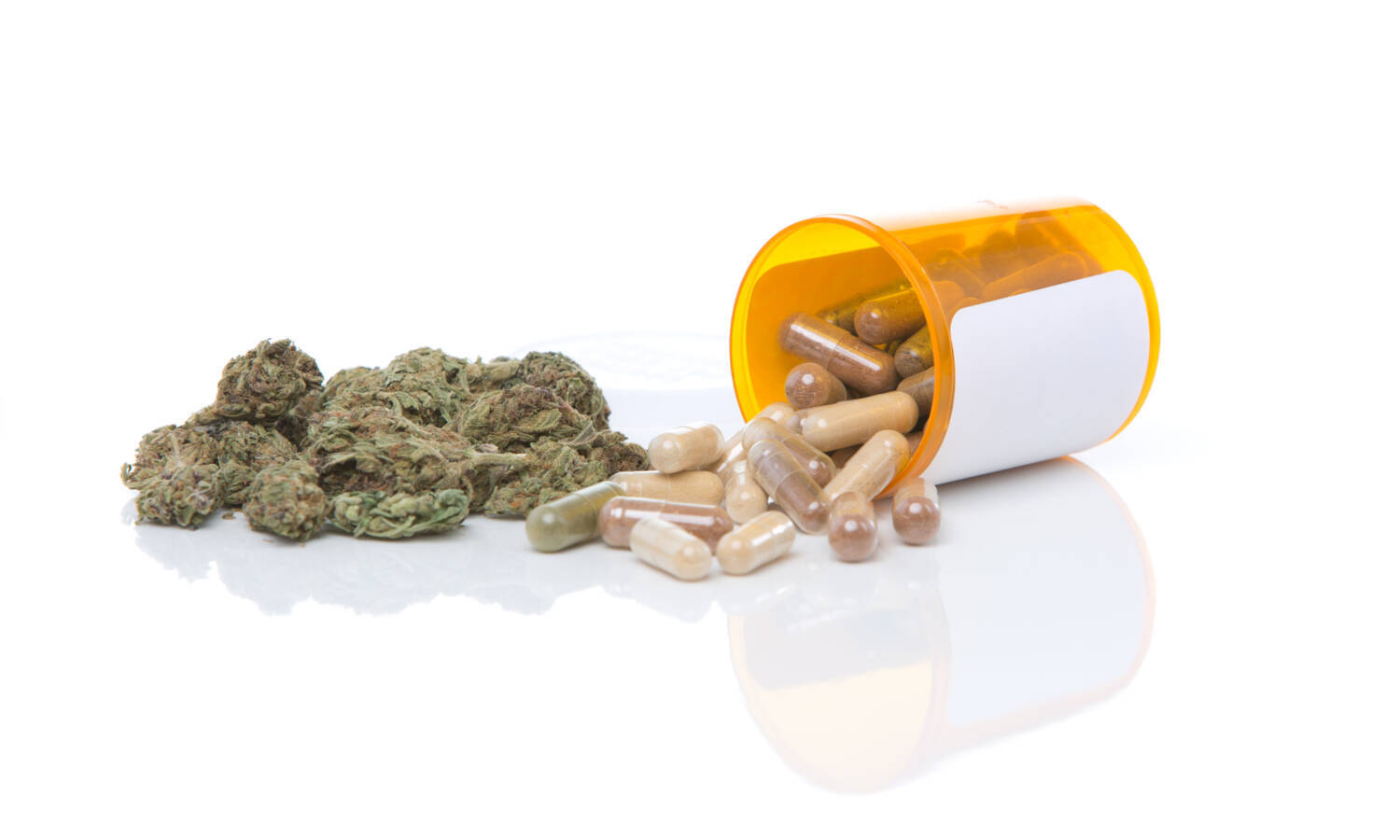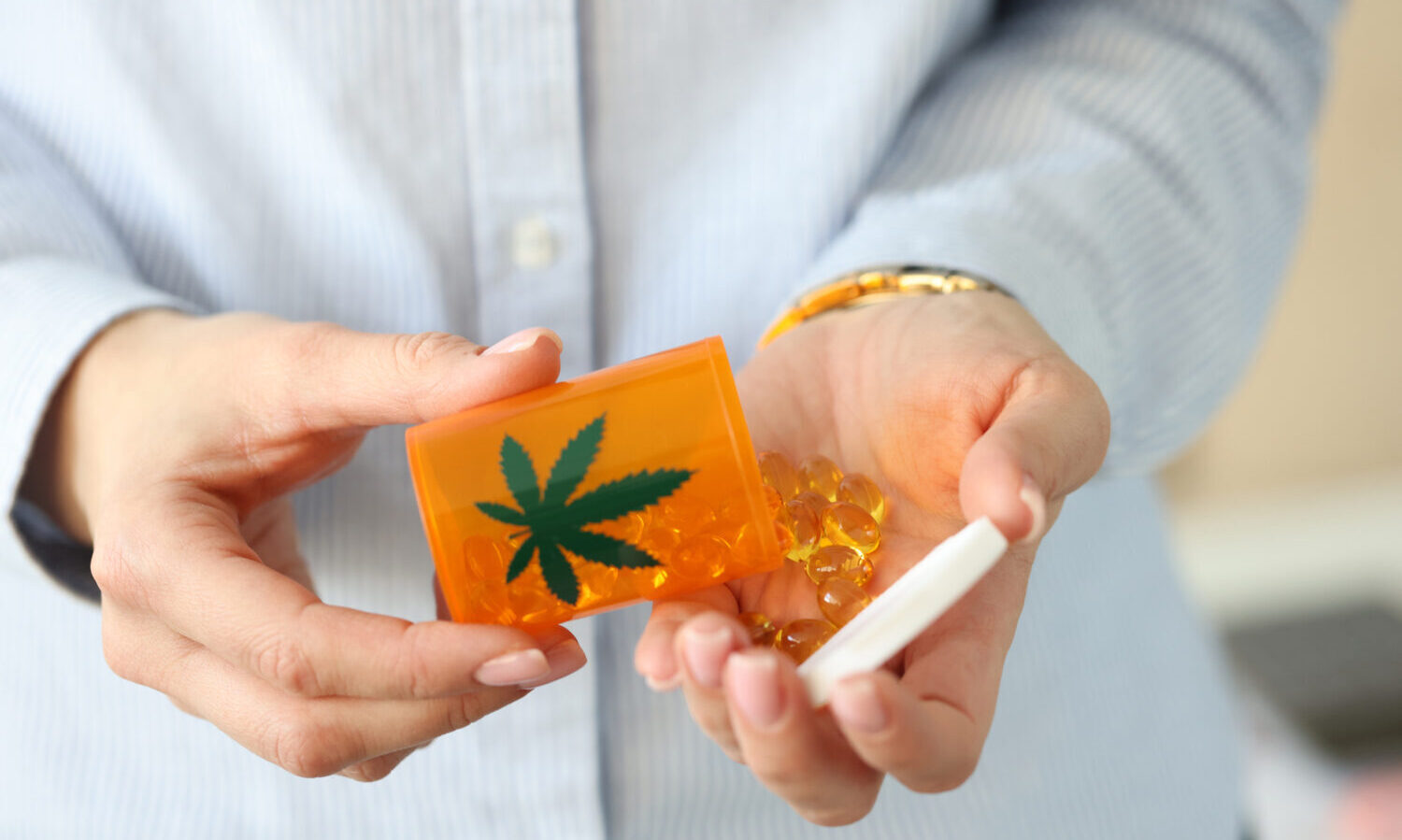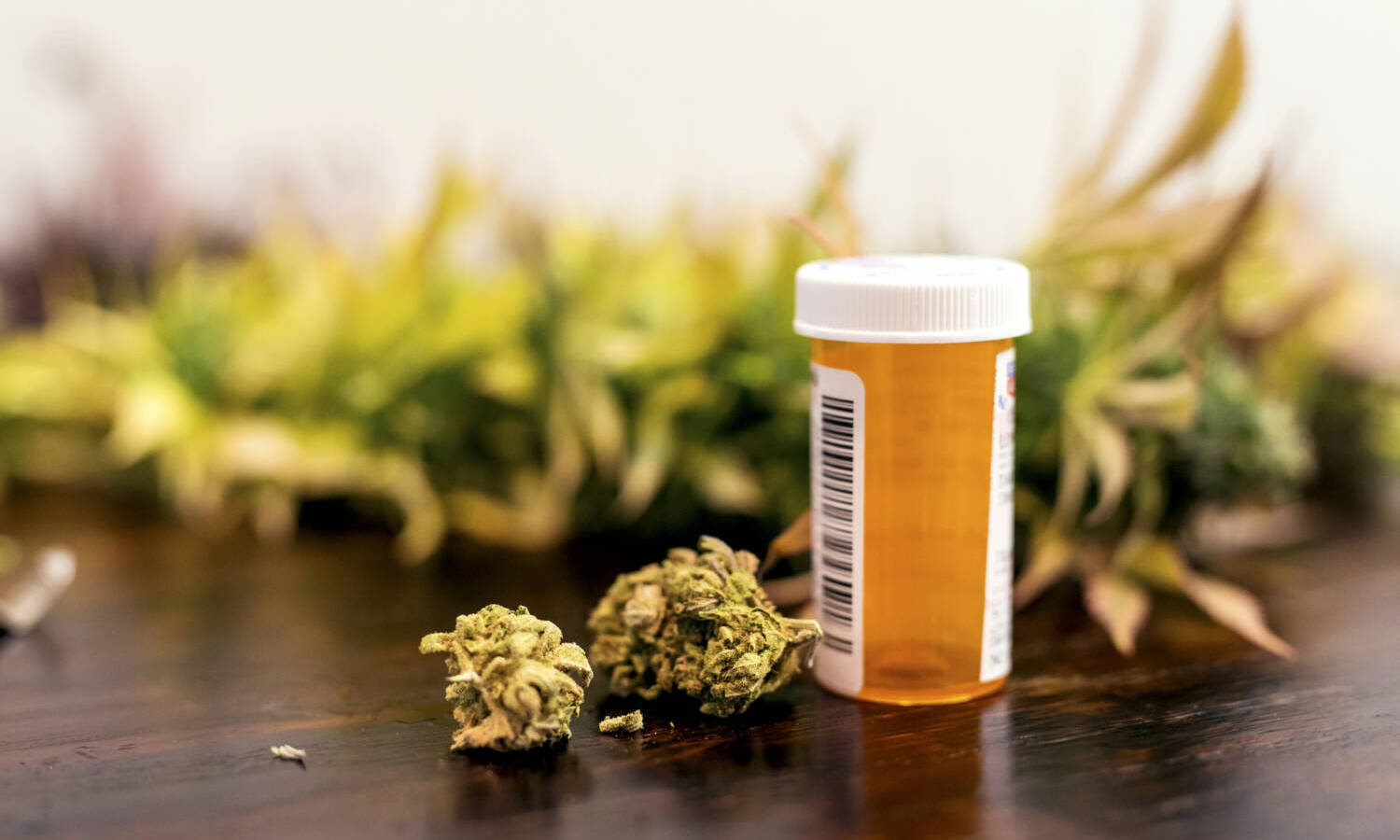Business
Does Cannabis Interact With Pharmaceutical Medications?

Potential interactions with different drugs could be both good and bad and vary significantly from strain to strain.
All chemical compounds interact with other chemicals in a unique manner. This includes over-the-counter drugs and prescription pharmaceuticals all the way to illicit substances. That’s why it is important to always seek the opinion of a pharmacist before mixing any drugs, and cannabis is no exception.
Cannabis interactions have been identified to be relatively mild in most cases with the interactions being mostly favorable. This however does not mean that one should let their guard down and consume them willy nilly when they are on other medications. While most interactions are positive, others could be negative with adverse effects.

Before we dive into a description of some of the most common drugs people have been known to combine with cannabis, let us first explain the difference between “synergistic” and “additive” effects. When a compound has an additive effect, what this means is that the final effect is the sum of their individual effects (I.e. 1+1=2). Synergistic effects on the other hand are altered and mostly greater than the sum of their individual effects (i.e. 1+1=3).
It is also important to keep in mind that the individual composition of each batch of weed might differ significantly from another, therefore triggering different effects.
To answer the question of whether cannabis interacts with other medicines, the answer is yes! Not only are the cannabinoid levels of the cannabis affected by interacting with other medications and drugs, the cannabinoids themselves can influence medication concentrations too.
Here are some ways in which this interaction happens:
Pharmacodynamic interactions: Cannabis can interfere with the way a drug is designed to interact with its target receptors. This interference could either hinder or potentiate the effects of the drug.
Pharmacokinetic interactions: The compounds in cannabis can also change the way in which the drug gets absorbed, metabolized, absorbed by tissue in the body, and excreted. The effect of the cannabis compounds changes the expression of different enzymes which either induces (exhibits higher activity) or inhibits them.
Inhibiting membrane transporters: Cannabis compounds can also have the effect of binding to membrane transporters, thereby inhibiting them.
Effect of drugs on cannabinoid levels: When drugs such as the antifungal ketoconazole are administered, both the levels of THC and CBD shoot up drastically, sometimes to even double the intake. This is because of the inhibitory action ketoconazole has on the enzyme CYP34A. Verapamil and macrolides are other CYP34A inhibitors which would also produce the same effect. Other enzyme inhibitors that affect CYP2C9 are cotrimoxazole, amiodarone, and fluoxetine. This spike not only increases chances of experiencing side effects, it also augments THC’s psychoactive effects.
Effect on cannabinoids on the levels of other drugs: Not only does the presence of some drugs increase cannabinoid levels in the body, the cannabis compounds can also influence the concentration of some medications. For instance, CBD inhibits the action of CYP2C9, which in turn leads to tripling levels in the active metabolite contained in the drug clobazam. THC on the other hand is a CYP1A2 inducer. What this means is that it could theoretically decrease the concentrations of some psychiatric drugs such as haloperidol, olanzapine, and chlorpromazine. CBD is also a potent inhibitor of the enzyme CYP3A4 which is responsible for metabolizing almost a quarter of all drugs.

This effect is also observed in the use of marijuana with the anticoagulant drug, warfarin. In this case, INR, the blood clotting parameter goes very high, which results in the potential for markedly more significant bleeding complications. CYP3A4/5 inhibition after the use of cannabis with tacrolimus has indicated an almost three-fold spike in the tacrolimus levels.
Marijuana inhalation and drug clearance: Marijuana that is smoked accelerates the removal by over 40% of bronchodilators such as theophylline from the body. This is as a result of enhanced CYP1A2 activity. This effect can also be seen in individuals who indulge in smoking more than a couple of joints a week when taking drugs like olanzapine and clozapine. In this instance, smoking marijuana leads to reduced efficacy of the drug.
Marijuana’s additive effects: As we mentioned earlier, marijuana can have additive effects when used with some drugs. For instance, marijuana combined with drugs that stimulate or mimic sympathetic activity, like amphetamines, may cause the patient to experience either symptomatic or even hazardous tachycardia or hypertension. Cannabis used with drugs which inhibit the central nervous system such as opioid drugs or alcohol could depress the central nervous system even more, leading to sleepiness, drowsiness, and ataxia.
When marijuana is used together with drugs which inhibit cholinergic receptors, the tachycardia and confusion which occur with the use of these drugs may worsen.
Marijuana and sedatives: The effect of marijuana on sedatives is also an additive one. Many sedatives like alcohol, benzodiazepines (Valium, Ativan, etc.), as well as some antidepressants and barbiturates like phenobarbital, and narcotics like codeine–influence the GABA neurotransmitters found in the central nervous system, which produces a calming effect. Likewise, cannabinoids (and even terpenes such as myrcene), also have their own sedative effects, depending on strain and concentrations of cannabinoids.
When such cannabinoids are combined with sedatives, an additive effect is created. While it does not have a synergistic effect like say mixing sedatives and alcohol, cannabis does add to the effect and should therefore be used in combination judiciously.
CBD and cytochrome P450: We have already discussed the action of cannabis on some enzymes. Of all the enzymes marijuana affects, its effect on Cytochrome P450 might just be the most prominent yet. P450 is a class of enzymes considered to be essential which play a vital role in drug interactions. Although evidence strongly suggests that CBD is well-tolerated, generally safe, and non-addictive (anti-addictive even), it has been known to interact synergistically (adversely or beneficially) with other medications in some patients. How so?
Most notably is the interplay between cytochrome P450 and CBD in the use of anti-seizure, and epilepsy medications. A small study that was published in 2015 found the intake of CBD elevated the blood concentrations of clobazam (which is an anticonvulsant), in children, at the same time elevating norclobazam (which is an “active metabolite of clobazam”).
The good news here is that the remedy seems to be fairly straightforward: the introduction of CBD can lead to the reduction of the dosage of clobazam, which is beneficial in reducing side effects. The benefits of these combinations even extended to a reduction in seizures, with 9 out of the 13 participants experiencing a 50%+ reduction in seizures. The researchers therefore concluded that “CBD used in combination with clobazam, is a safe and effective treatment of refractory epilepsy.”

How Does THC Interact With Other Medications?
One of THC’s major properties is that it interacts with both CB1, and CB2 cannabinoid receptors simultaneously. This induces a “cardiovascular stress response” which can raise cardiac oxygen consumption, and at the same time reduce blood flow into the coronary arteries. Though reports of adverse effects are relatively rare, if patients are on blood pressure medication, they should be aware of the compound effects cannabis may have.
As we have seen with CBD, THC could also increase the effect of blood thinning drugs (e.g. warfarin or heparin), or those which are known to carry their own risk of blood thinning such as ibuprofen, and naproxen, etc. This could happen by cannabis slowing down the metabolism of the drugs or to a lesser extent, THC could displace the warfarin from protein binding sites.
Using CBD Safely While Taking Other Medications
CBD has several therapeutic benefits that are being revealed by science. The fact that it has a very wide safety profile has made many people erroneously believe that there’s totally no risk in mixing CBD with pharmaceuticals.
If you are thinking about trying CBD as an “add-on therapy” to ease the symptoms of a medical condition, here are a couple of considerations to have in mind:
- First talk to your doctor about your decision. They might be to determine a schedule, CBD product, and dosage that would be appropriate for your medications. In some cases, your doctor may choose to monitor your blood plasma levels depending on the medications you are taking.
- Don’t stop any medications you are taking for substitution with CBD unless your doctor says that it is expressly okay to do so.
- Topical CBD solutions such as creams, lotions, and salves can be an option. Unlike edibles, vaping solutions, and oils, topicals typically do not get into your bloodstream and would therefore react less. This is especially true for topicals that are not intended to be a transdermal solution.
- Look out for the grapefruit warning: Even though studies are still being done to determine the potential interactions between specific medications and CBD, it is a general rule of thumb to avoid CBD if your medications contain a grapefruit warning on their label. If you are taking CBD, you should avoid medications that have a grapefruit warning because chemicals found in grapefruit called furanocoumarins inhibit CYP3A4, much in the same way that CBD does. The result of this inhibition is slowed metabolization of medications.
Some of the medications that commonly have a grapefruit warning are:
- Antibiotics and antimicrobials
- Anticancer medications
- Antihistamines
- Antiepileptic drugs (AEDs)
- Blood pressure medications
- Blood thinners
- Cholesterol medications
- Corticosteroids
- Erectile dysfunction medications
- GI medications, like some used to treat nausea or GERD
- Heart rhythm medications
- Immunosuppressants
- Mood medications, used to treat depression, anxiety, or mood disorders
- Pain medications
- Prostate medications

Safety and Side Effects
If you have started taking CBD alongside your medications, always remember to look out for changes in how either the CBD or medication affect you. Some side-effects you could watch out for are:
- Drowsiness
- Sedation
- Nausea
- Decrease in the effectiveness of the medication like breakthrough seizures
- Fatigue
- Diarrhea
- Changes in appetite
- Changes in weight
How Does Cannabis Interact With Thyroid Medications?
Hashimoto’s thyroiditis, which is also called autoimmune or “chronic lymphocytic thyroiditis”, is the most commonly occurring form of thyroiditis. CBD oil has been known to have positive effects in this condition due to its anti-inflammatory properties as well as its ability to be an immunosuppressant.
However, when thyroid medication and CBD oil are taken together, they tend to have an interaction as they are both competing for metabolism. Remember the cytochrome P450 pathways? This competition would lead to hyperthyroidism as thyroxine would end up accumulating in the body before it has a chance to metabolize it. Taking thyroid medication and CBD oil too close together could also lead to mild nausea, as well as anxiety in some patients.
Interestingly, if a few hours are allotted between the time the thyroid medication is taken and the time the CBD oil is taken, the effects seem to be less common. This could indicate that the two treatments can be taken by the same person as they have different benefits, only not at the same time.
Having said this, it is important to remember that there are not many conclusive studies on the subject and therefore it would be wise to tread with a bit of caution.
Should You Take Paracetamol When Stoned?
Absolutely yes! Though the paracetamol might potentiate the effects of the cannabis, it certainly is not harmful. If you feel that you need to take some painkillers before you smoke your weed, you could do so. Take a few tokes and wait a little to observe the effects. If you seem to be tolerating it well, you can go ahead and finish the whole joint.
Conclusion
For most patients, CBD and cannabis are relatively safe. Nonetheless, cannabis happens to be a complex plant that comprises numerous compounds ranging from cannabinoids to terpenes. Influenced by these vast cannabinoid and terpene profiles, potential interactions with different drugs could be both good and bad and vary significantly from strain to strain.
In this regard, though some general conclusions can be made, drawing broad hypotheses to describe how cannabis will interact with cannabis can be inevitably misleading.
Source: https://thefreshtoast.com/cannabis/does-cannabis-interact-with-pharmaceutical-medications/
Business
New Mexico cannabis operator fined, loses license for alleged BioTrack fraud

New Mexico regulators fined a cannabis operator nearly $300,000 and revoked its license after the company allegedly created fake reports in the state’s traceability software.
The New Mexico Cannabis Control Division (CCD) accused marijuana manufacturer and retailer Golden Roots of 11 violations, according to Albuquerque Business First.
Golden Roots operates the The Cannabis Revolution Dispensary.
The majority of the violations are related to the Albuquerque company’s improper use of BioTrack, which has been New Mexico’s track-and-trace vendor since 2015.
The CCD alleges Golden Roots reported marijuana production only two months after it had received its vertically integrated license, according to Albuquerque Business First.
Because cannabis takes longer than two months to be cultivated, the CCD was suspicious of the report.
After inspecting the company’s premises, the CCD alleged Golden Roots reported cultivation, transportation and sales in BioTrack but wasn’t able to provide officers who inspected the site evidence that the operator was cultivating cannabis.
In April, the CCD revoked Golden Roots’ license and issued a $10,000 fine, according to the news outlet.
The company requested a hearing, which the regulator scheduled for Sept. 1.
At the hearing, the CCD testified that the company’s dried-cannabis weights in BioTrack were suspicious because they didn’t seem to accurately reflect how much weight marijuana loses as it dries.
Company employees also poorly accounted for why they were making adjustments in the system of up to 24 pounds of cannabis, making comments such as “bad” or “mistake” in the software, Albuquerque Business First reported.
Golden Roots was fined $298,972.05 – the amount regulators allege the company made selling products that weren’t properly accounted for in BioTrack.
The CCD has been cracking down on cannabis operators accused of selling products procured from out-of-state or not grown legally:
- Regulators alleged in August that Albuquerque dispensary Sawmill Sweet Leaf sold out-of-state products and didn’t have a license for extraction.
- Paradise Exotics Distro lost its license in July after regulators alleged the company sold products made in California.
Golden Roots was the first alleged rulebreaker in New Mexico to be asked to pay a large fine.
Source: https://mjbizdaily.com/new-mexico-cannabis-operator-fined-loses-license-for-alleged-biotrack-fraud/
Business
Marijuana companies suing US attorney general in federal prohibition challenge

Four marijuana companies, including a multistate operator, have filed a lawsuit against U.S. Attorney General Merrick Garland in which they allege the federal MJ prohibition under the Controlled Substances Act is no longer constitutional.
According to the complaint, filed Thursday in U.S. District Court in Massachusetts, retailer Canna Provisions, Treevit delivery service CEO Gyasi Sellers, cultivator Wiseacre Farm and MSO Verano Holdings Corp. are all harmed by “the federal government’s unconstitutional ban on cultivating, manufacturing, distributing, or possessing intrastate marijuana.”
Verano is headquartered in Chicago but has operations in Massachusetts; the other three operators are based in Massachusetts.
The lawsuit seeks a ruling that the “Controlled Substances Act is unconstitutional as applied to the intrastate cultivation, manufacture, possession, and distribution of marijuana pursuant to state law.”
The companies want the case to go before the U.S. Supreme Court.
They hired prominent law firm Boies Schiller Flexner to represent them.
The New York-based firm’s principal is David Boies, whose former clients include Microsoft, former presidential candidate Al Gore and Elizabeth Holmes’ disgraced startup Theranos.
Similar challenges to the federal Controlled Substances Act (CSA) have failed.
One such challenge led to a landmark Supreme Court decision in 2005.
In Gonzalez vs. Raich, the highest court in the United States ruled in a 6-3 decision that the commerce clause of the U.S. Constitution gave Congress the power to outlaw marijuana federally, even though state laws allow the cultivation and sale of cannabis.
In the 18 years since that ruling, 23 states and the District of Columbia have legalized adult-use marijuana and the federal government has allowed a multibillion-dollar cannabis industry to thrive.
Since both Congress and the U.S. Department of Justice, currently headed by Garland, have declined to intervene in state-licensed marijuana markets, the key facts that led to the Supreme Court’s 2005 ruling “no longer apply,” Boies said in a statement Thursday.
“The Supreme Court has since made clear that the federal government lacks the authority to regulate purely intrastate commerce,” Boies said.
“Moreover, the facts on which those precedents are based are no longer true.”
Verano President Darren Weiss said in a statement the company is “prepared to bring this case all the way to the Supreme Court in order to align federal law with how Congress has acted for years.”
While the Biden administration’s push to reschedule marijuana would help solve marijuana operators’ federal tax woes, neither rescheduling nor modest Congressional reforms such as the SAFER Banking Act “solve the fundamental issue,” Weiss added.
“The application of the CSA to lawful state-run cannabis business is an unconstitutional overreach on state sovereignty that has led to decades of harm, failed businesses, lost jobs, and unsafe working conditions.”
Business
Alabama to make another attempt Dec. 1 to award medical cannabis licenses

Alabama regulators are targeting Dec. 1 to award the first batch of medical cannabis business licenses after the agency’s first two attempts were scrapped because of scoring errors and litigation.
The first licenses will be awarded to individual cultivators, delivery providers, processors, dispensaries and state testing labs, according to the Alabama Medical Cannabis Commission (AMCC).
Then, on Dec. 12, the AMCC will award licenses for vertically integrated operations, a designation set primarily for multistate operators.
Licenses are expected to be handed out 28 days after they have been awarded, so MMJ production could begin in early January, according to the Alabama Daily News.
That means MMJ products could be available for patients around early March, an AMCC spokesperson told the media outlet.
Regulators initially awarded 21 business licenses in June, only to void them after applicants alleged inconsistencies with how the applications were scored.
Then, in August, the state awarded 24 different licenses – 19 went to June recipients – only to reverse themselves again and scratch those licenses after spurned applicants filed lawsuits.
A state judge dismissed a lawsuit filed by Chicago-based MSO Verano Holdings Corp., but another lawsuit is pending.
Source: https://mjbizdaily.com/alabama-plans-to-award-medical-cannabis-licenses-dec-1/
-

 Business2 years ago
Business2 years agoPot Odor Does Not Justify Probable Cause for Vehicle Searches, Minnesota Court Affirms
-

 Business2 years ago
Business2 years agoNew Mexico cannabis operator fined, loses license for alleged BioTrack fraud
-

 Business2 years ago
Business2 years agoAlabama to make another attempt Dec. 1 to award medical cannabis licenses
-

 Business2 years ago
Business2 years agoWashington State Pays Out $9.4 Million in Refunds Relating to Drug Convictions
-

 Business2 years ago
Business2 years agoMarijuana companies suing US attorney general in federal prohibition challenge
-

 Business2 years ago
Business2 years agoLegal Marijuana Handed A Nothing Burger From NY State
-

 Business2 years ago
Business2 years agoCan Cannabis Help Seasonal Depression
-

 Blogs2 years ago
Blogs2 years agoCannabis Art Is Flourishing On Etsy





